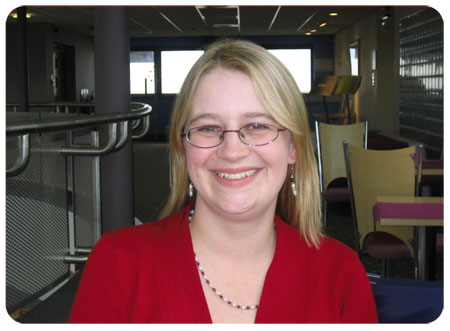A first impression
Why would over 1,000 ELT professionals, including teachers, trainers, authors, publishers, and providers of in-service training descend on a city on the north-east coast of Scotland for five days in April? The answer lies not in the weather - when I left home it was a gloriously sunny 28°C in Germany, whereas in Aberdeen it was 12°C and vaguely sunny but with intermittent drizzle. It wasn't due to a sudden boom in tourism, although Aberdeen can be charming when the clouds break and the sun lights the granite buildings which give the city its distinctive look. No, the reason was the 41st annual IATEFL conference at the Aberdeen exhibition and conference centre.
Although I've been a member of IATEFL for many years and regularly travel to the annual Business English Special Interest Group (BESIG) conferences, this was the first full-blown IATEFL conference I'd attended. It seemed like I'd been preparing for it for ages (I held a workshop on Blended Learning), but in reality the conference proper started for me at Heathrow airport. Waiting at the domestic flight terminal I bumped into friends and colleagues I hadn't seen since the last conference, event, workshop, seminar or training course. Old friendships were rekindled and new friendships were struck up, which was just as well as it meant we were able to share taxis from Aberdeen airport to our hotels and hostels around the city; a practical element which thankfully reduced the rather long taxi queue at the taxi stand.
A trend
It was clear that this year's hot topic was technology in the classroom and, in particular, blended learning. If you took a walk around the generous-sized exhibition hall, you were likely to stumble across demonstrations of interactive whiteboards and other intriguing ways of integrating online and e-learning into your courses. The brand new books on Blended Learning and Technology in the Classroom flew off the stands, and no new dictionary or course book was complete without an interactive CD-ROM or even a DVD-ROM.
The buzz words in the workshop descriptions seemed to be:
- blended learning
- technology enhanced language learning (TELL)
- podcasting and vodcasting
- internet
- online
- computer technology
- Moodle and other virtual learning environments (VLEs)
- e-materials
This trend in technology was also reflected in the online coverage that the British Council gave the conference. In addition to a daily blog from their own reporters, the Council was broadcasting sessions and talks 'almost live' through the internet, and hosting moderated discussions. Amazingly, over 4,000 people attended the conference virtually from the comfort of their own living room or local internet café via the British Council's website.
A talk
I decided to follow a learning technologies track through the conference. This was made easier by the programme which, as well as giving detailed descriptions of every workshop, provided a section called Areas of Interest. This gave delegates who were interested in specific subjects an overview of the workshops in that area of interest, e.g. English for specific purposes (ESP), materials design, teacher development, and global issues.
I attended a very useful workshop presented by Richard Cain of the British Council in Thailand, called Podcasting for Beginners, which proved that you don't need to be a technophile to bring technology into your classroom.
Another well-attended talk had the very promising title, Innovative ideas for using online videos from YouTube and beyond. Overall, the technical backup provided by the conference centre was marvellous. In this instance, however, the presenter lost his internet connection in the middle of his talk. But, like all good presenters, he had a Plan B and showed us some he had downloaded earlier.
This proved to me that there is still room for improvement in this field of ELT and I expect to see a lot more techie-type workshops next year.
No conference would be complete without going to see at least one big name, and so I squeezed into a large but over-crowded room to see Jeremy Harmer taking us out of our 'comfort zone' and into the world of Watching teachers watch themselves.
A moment
One of the things I most enjoy about these types of conferences is meeting people who work in the same field as me, but who live in completely different places around the world. The IATEFL organizers put on free buses to ferry the delegates to and from the conference centre. These bus rides often lasted half an hour or more, which I found provided a wonderful opportunity to talk to whoever was sitting next to me. I had a very nice chat with Baoning Hua from China who was at the conference with her colleague. She told me that her main reason for attending the conference was because she's very interested in what's going on in the world of ELT outside of China.
I also talked to Simson Shilong from Namibia, one of the 21 scholars sponsored by the Hornsby Trust who were attending the conference from such far-flung countries as Cameroon and Cuba. Simson told me that he was hoping to find out how to adapt ideas from IATEFL into his own work as a teacher trainer. He hoped that the knowledge he gained at IATEFL would benefit his colleagues and students back home.
I also talked to Rachel Hunt, who had flown over from Australia with her baby to give a talk at the conference. Rachel was 2006's overall winner of the onestopenglish monthly Methodology Challenge. In addition to receiving £100 prize money, Rachel was asked to fly over to Scotland and present her winning paper, Grammar and vocabulary: teaching collocations. Rachel admitted she was terribly nervous but that she was thrilled to be there. She also said that Aberdeen was a great city and that her first impression of the conference was that it was "big", had a "large choice of workshops" and that there was "loads to see". She said that, as far as she was aware, there is nothing on the scale of IATEFL in Australia. Taking advantage of being here she decided to go to see as many "big ELT names" as possible. These included Dave Willis, Guy Cook and Jeremy Harmer. She was not disappointed. I asked Rachel whether she would attend another IATEFL conference in the future. She answered in the affirmative, saying, "On the strength of this conference experience I'd love to go to another conference next year."
A closing word
Teaching can be a lonely profession, even if you work for a school or institute you may only meet up with your colleagues during short lesson breaks. So if you're a freelancer, like me, belonging to a teachers' association is one of the best ways to keep up to date with what's going on in our profession.
I think Rachel's last comment says it all. If you've never been to an ELT conference, it's high time you did. Once you've been, you'll want to go back again next year, not only to attend workshops and talks, but to meet up with your new friends and colleagues from the world of ELT.

Rachel Hunt (onestopenglish Methodology Challenge competition winner).

The University of Aberdeen.




No comments yet